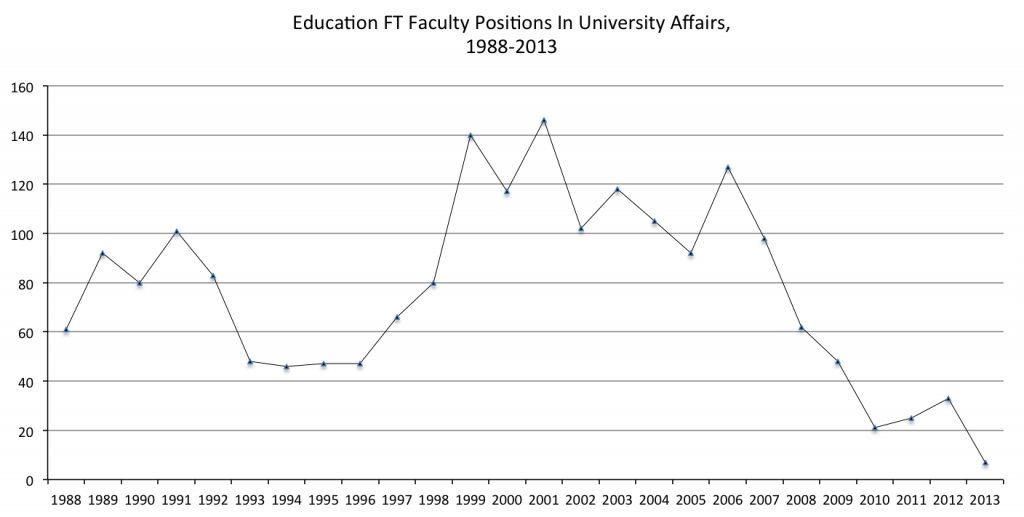
Oftentimes, the academic job market for full-time (FT) faculty is inversely related to economic recessions. Not anymore. In this prolonged Great Recession, turned Great Depression II in parts of North America and across the world, youth have been particularly hard hit, more pronounced by race. The most common description for this current economy for youth is “a precipitous decline in employment and a corresponding increase in unemployment.” In Canada and the US, unemployment rates for the 16-19 year olds exceed 25%. At the same time, one of the most common descriptions for postsecondary enrollment and participation in Canada and the US is “tremendous growth at the undergraduate level… the number of graduate students has grown significantly faster than the number of undergraduate students over the last 30 years.” With “school-to-work” and “youth employment” oxymoronic, corporate academia and the education industry are capitalizing on masses of students returning to desperately secure advanced credentials in hard times, but no longer does this matter to the professoriate.
If higher education enrollment has been significant, increases in online or e-learning enrollment have been phenomenal. Postsecondary institutions in North America commonly realized 100% increases in online course enrollment from the early 2000s to the present with the percentage of total registrations increasing to 25% for some universities. In Canada, this translates to about 250,000 postsecondary students currently taking online courses but has not translated into FT faculty appointments. More pointedly, it has eroded the FT faculty job market and fueled the part-time (PT) job economy of higher education. About 50% of all faculty in North America are PT but this seems to jump to about 85%-90% for those teaching online courses. For example, in the University of British Columbia’s (UBC) Master of Educational Technology (MET), where there are nearly 1,000 registrations per year, 85% of all sections are taught by PT faculty. In its decade of existence, not a single FT faculty member has been hired for this revenue generating program. Mirroring trends across North America, support staff doubling as adjunct or sessional teach about 45% of MET courses in addition to their 8:30-4:30 job functions in the service units. These indicators are of a larger scope of trends in the automation of intellectual work.
Given these practices across Canada, in the field of Education for example, there has been a precipitous decline in employment of FT faculty, which corresponds with the precipitous decline in employment of youth (Figure 1). Education is fairly reflective of the overall academic job market for doctorates in Canada. Except for short-term trends in certain disciplines, the market for PhDs is bleak. Trends and an expansion of the Great Recession predict that the market will worsen for graduates looking for FT academic jobs in all disciplines. A postdoctoral appointment market is very unlikely to materialize at any scale to offset trends. For instance, Education at UBC currently employs just a handful (i.e., 4-5) of postdocs.
To put it in mild, simple terms: Universities changed their priorities and values by devaluing academic budget lines. Now in inverse relationship to the increases in revenue realized by universities through the 2000s, academic budgets were progressively reduced from 40% or more to just around 20% for many of these institutions. One indicator of this trend is the expansion of adjunct labor or PT academics. In some colleges or faculties, such as Education at UBC, the number of PT faculty, which approached twice that of FT in 2008, teach from 33% to 85% of all sections, depending on the program.
Another indicator is the displacement of tenure track research faculty by non-tenure track, teaching-intensive positions. For example, in Education at UBC, about 18 of the last 25 FT faculty hires were for non-tenure track teaching-intensive positions (i.e., 10 courses per year for Instructor, Lecturer, etc.). This was partially to offset a trend of PT faculty hires pushing Education well over its faculty salary budget (e.g., 240 PT appointments in 2008). Measures in North America have been so draconian that the American Association of University Professors (AAUP) was compelled to report in 2010 that “the tenure system has all but collapsed…. the proportion of teaching-intensive to research-intensive appointments has risen sharply. However, the majority of teaching-intensive positions have been shunted outside of the tenure system.” What is faculty governance, other than an oligarchy, with a handful of faculty governing or to govern?
Read More: Petrina, S. & Ross, E. W. (2014). Critical University Studies: Workplace, Milestones, Crossroads, Respect, Truth. Workplace, 23, 62-71.

 Follow
Follow

Equity, Governance, Economics and Critical University Studies #criticaled #edstudies #ubc #ubced #bced #yteubc
Workplace: A Journal for Academic Labor
Equity, Governance, Economics and Critical University Studies
No 23 (2014)
As we state in our Commentary, “This Issue marks a couple of milestones and crossroads for Workplace. We are celebrating fifteen years of dynamic, insightful, if not inciting, critical university studies (CUS). Perhaps more than anything, and perhaps closer to the ground than any CUS publication of this era, Workplace documents changes, crossroads, and the hard won struggles to maintain academic dignity, freedom, justice, and integrity in this volatile occupation we call higher education.” Workplace and Critical Education are published by the Institute for Critical Education Studies (ICES).
Commentary
Articles
Leave a comment
Posted in AAUP, Academic freedom, Adjuncts, Administration, BC Education, Commentary, Critical Education, Critical University Studies, Environment, Equity, Ethics, Governance, Government, Organizing, Research, Student Movement, Student Speech, Students, Working condition
Tagged Academic freedom, BC education, Budgets & Funding, Critical Education, Equity, Ethics, Government, Publishing, Students, Working conditions, Workplace Journal